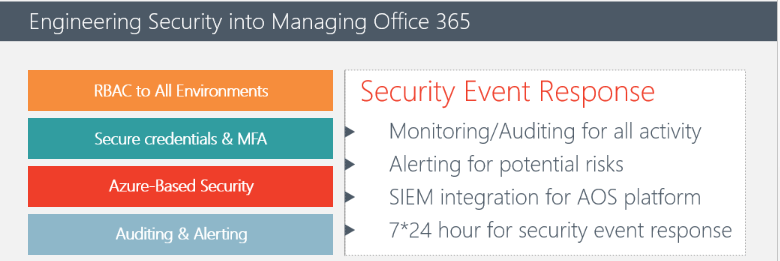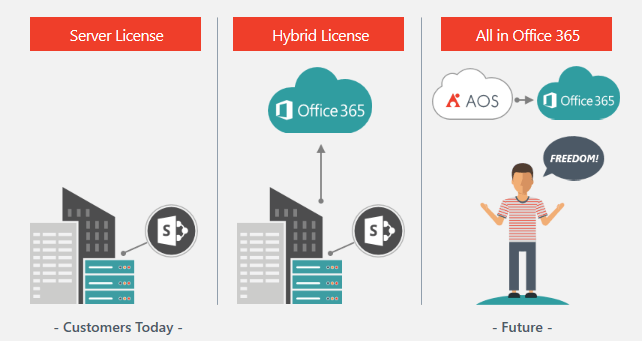Are you concerned about potential low adoption rates of new software? Register for our free webinar “How to Achieve 90% Microsoft Teams and Yammer Adoption in 3 Months” for tried and true solutions.
Not All SaaS is Created Equal
As more organizations evaluate software-as-a-service (SaaS) solutions, buyers need to not only compare features, but also the core cloud platforms on which they sit.
It is an arduous and expensive journey to develop a high-quality cloud architecture that supports users’ security and operational needs. Frankly, many vendors just cut corners and hope you don’t notice.

It’s the modern day equivalent of buying a flashy set of clothes only to discover they were made with cheap materials and have come apart in the first wash. Both scenarios involve buyer’s remorse, but when purchasing SaaS solutions the stakes are far higher.
Here are the eight areas you should pay careful attention to when evaluating the quality of SaaS solutions.
Blog: Read my first-hand account of AvePoint’s digital transformation as a SaaS vendor and the lessons I learned.
Be wary if you see any Office 365 vendor skip over or minimize the importance of these areas during their presentation—it’s a big red flag that their SaaS is too immature to support business critical workloads that require basic security controls.
Table of Contents
- SaaS Quality Measure 1: Hyper Scale and High Availability
- SaaS Quality Measure 2: Release Frequency
- SaaS Quality Measure 3: API Extensibility and Integration
- SaaS Quality Measure 4: Security Architecture
- SaaS Quality Measure 5: Deployment Options
- SaaS Quality Measure 6: Support Options
- SaaS Quality Measure 7: Licensing
- SaaS Quality Measure 8: Track Records and Industry Credibility

SaaS Quality Measure 1: Hyper Scale and High Availability
Does your SaaS vendor only support one cloud instance? If so, you could be out of luck and unable to access your data if that region goes down. Where that cloud instance is located can be important as well if your organization needs to be compliant with data soverignty regulations.
Multiple instances creates regional redundancy and cloud service resiliency, which is why AvePoint has taken the necessary steps for its SaaS solutions to be available in 11 different global cloud instances. This includes our latest locations in Germany, France, and China, as well as FedRamp certified US Government data centers.
Frankly, many vendors just cut corners and hope you don’t notice. Click To TweetThis can be seen in the 99.5% availability and uptime we are able to support backed by Microsoft Azure and world-class support.
AvePoint’s SaaS solutions are deployed to the same data centers as Office 365 ensuring user requests, forms and other interfaces have the best performance. By leveraging the Azure Cloud Services platforms our user-facing requests can scale up to leverage an unlimited number of servers dynamically to meet demand.

SaaS Quality Measure 2: Release Frequency
Frequent releases and a smooth update process ensures the latest security patches are installed, reported issues are quickly fixed and time to innovation is reduced.
AvePoint employs DevOp and Agile methodology to manage the upgrade, testing, and release process for all customers, ensuring each account is maintained on a common base of code. This allows us to be more agile and release updates more frequently than other vendors.
Blog: The Evolution of the Software Industry: A Journey to SaaS
In addition, we also leverage Azure micro services architecture, so we could achieve tenant level live patching and tenant level release ring protection across our multi-tenant SaaS platform, this kind of maturity and scalability in seamless platform updates is a business must requirement for today’s high primary Cloud production environments.

SaaS Quality Measure 3: API Extensibility and Integration
A core question to ask your SaaS vendor is how easy is it to integrate their solution with other systems? How difficult is it to extend the solution and create custom actions for the unique needs of your organization?
AvePoint SaaS solutions for example allow you to perform customizations with low code scriptable actions and no code integration with other systems.

SaaS Quality Measure 4: Security Architecture
When you are leveraging the SaaS solutions of a vendor, you are inheriting their level of commitment to organizational security. Certifications and standards like FedRAMP and ISO 27001 are important indicators that a SaaS vendor is fully committed to the security of their solutions.
This is important as security (in technology, process, and people) are top of mind requirements not only for the Cloud platform providers, but also for all and any third-party Cloud solution providers.
Q&A: AvePoint CEO on Saving $400K Using Skype for Business
Another helpful question to ascertain your SaaS vendor’s dedication to security is what level of access they have to your data. For example, AvePoint leverages Azure Key Vault to provide unique encryption keys for each tenant that is owned by each customer to prevent unauthorized access.
We also give our customers the flexibility to chose their own data storage or authentication with Office 365 credentials. In other words, we allow for BYOS (Bring Your Own Storage), BYOK (Bring Your Own Key), and BYOA (Bring Your Own Authentication).

SaaS Quality Measure 5: Deployment Options
Can your SaaS vendor support their deployment in on-premise, hybrid and all-in cloud environments? Legacy vendors might have immature SaaS solutions that aren’t fully ready for the cloud whereas younger more immature vendors may have been born in the cloud but can’t fully cover hybrid deployments.

SaaS Quality Measure 6: Support Options
If you are having trouble with implementing or configuring your SaaS solution, no matter how straight forward it may be, you need to protect yourself against Murphy’s Law and demand 24/7 global support. Be sure to also ask if your SaaS vendor has customer success focus, and better yet, have a global customer success organization whose primary KPI is based on your successful deployment.
![]()
SaaS Quality Measure 7: Licensing
A good SaaS vendor will have multiple licensing options to make their solutions easy to buy. There is no need for large upfront expenses or complex pricing. The best SaaS vendors will also have modular access to functionality to address specific customer needs, flexible user adoption ramp up schedules, and even down to flexible monthly, quarterly, to yearly contract plans. Again, operational expediency and customer satisfaction should manifest in SaaS vendor’s licensing flexibility.
For example, AvePoint not only offers an unlimited amount of cloud backup priced per user but we also offer an unlimited amount of users and price per amount of backup needed.

SaaS Quality Measure 8: Track Records and Industry Credibility
One of the great advantages of the cloud is that it lets smaller companies compete with more established players. However, there are certain risks surrounding continuity and product innovation that come with leveraging SaaS solutions from smaller, younger companies.
Enterprises have complex and nuanced IT system and data deployment setups and integration needs, planning a smooth transition to Cloud, managing hybrid scenarios while the entire organization evolves to adopt to new digital transformation initiatives, are the type of use cases industry experiences and enterprise level know-how can truly be invaluable.
If this is important for your organization, you should investigate your vendor’s history and “industry cred.”
- What awards have they won? (We’ve won a few)
- Do they employ any Microsoft Regional Directors or MVPs? (AvePoint has 2 and 5 respectively)
- Are they on any Microsoft Product Advisory Councils? (AvePoint sits on 4)
- What associations do they participate and lead? (For example, AvePoint has been very involved with IAPP and other relevant organizations)
- What analyst reports are they mentioned in? (Check out what the analysts are saying about us)
Conclusion: Cover Your SaaS
Don’t assume that all Office 365 SaaS is created equal. Leveraging an immature solution can create headaches that can be easily avoided early in your decision making / vendor selection process.

